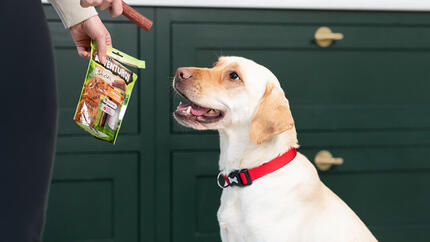
Just like in us humans, occasional coughing in dogs is completely normal - if it’s just the odd cough here and there. It’s a simple way for your pet to get rid of dust, germs and other things they’ve breathed in from their environment. However, if they seem to be coughing a lot, it could be a sign of something more serious.
Why is my dog coughing?
As a dog owner, you know that your four-legged friend spends the vast majority of their life sniffing. Unfortunately, this behaviour also makes them more prone to picking things up like bacteria, parasites or viruses which could lead to diseases or illnesses where coughing is a symptom. Below we discuss the most common diseases and illnesses that can result in coughing in dogs.
1. Heart disease
Disease of the heart valves or muscles can stop the heart from pumping blood efficiently which can cause parts of the heart to enlarge. In turn, this can lead to compression of major airways in the lungs or cause fluid to build up, causing coughing.
With this disease the coughing will sound soft and continuous, and it will likely worsen at night or when your pet is lying on their side. Apart from coughing, your dog may also show decreased energy or stamina. Consult your vet who will be able to examine your dog and suggest treatment or management options. Common treatments for heart disease in dogs involve medication and a change in diet.
2. Kennel cough
Kennel cough is a highly contagious illness that causes inflammation and infection of the windpipe and main lower airways. Dogs that spend time in groups such as at day-care, training classes or that tend to walk in areas with high populations of dogs are more at risk of catching this disease. However, many dog carers now require canines to be vaccinated against kennel cough before entering their care.
If your dog has kennel cough, it sounds like a hacking, dry and raspy cough which will usually go away on its own within a week or two. However, it’s still a good idea to take your dog to the vet as your pet may need antibiotics or cough suppressants – and you should isolate your dog from others to avoid passing it on.
3. Pneumonia
One of the reasons why your dog keeps coughing could be pneumonia. This is an infection that results in inflammation of the lungs which can be caused by bacteria, viral infection, regurgitation, metabolic disorders or swallowing difficulties. Coughing in dogs caused by pneumonia will sound wet and soft and there may be other symptoms present such as a high fever, lack of appetite and lethargy. If you suspect your dog has pneumonia, get them to the vet as soon as possible for treatment.
4. Collapsing trachea
This condition is most common in smaller or obese dogs and results from collapse of the rings of cartilage that make up the windpipe. This makes it very difficult for air to pass through the nose and into the animal’s lungs. If your dog keeps coughing, it sounds similar to a goose-like honking, and it gets worse if your dog pulls on the leash, the coughing may be caused by a collapsing trachea. If the trachea has completely collapsed, your dog may sound almost asthmatic. Treatment for this condition can include weight loss, cough suppressants, steroids, bronchodilators and antibiotics.
5. Heartworm
Heartworm is spread by mosquito bites, but luckily, heartworms aren’t currently found in dogs in the UK. However, this disease may be a concern if you’re planning on going on holiday with your pet. If you’ve been abroad with your pet and they now have a mild and persistent cough paired with lethargy, weight loss and a lack of appetite, the problem could be heartworm. If you’re going away with your dog to a country where heartworm may be a problem, speak to your vet for more information on how to protect your dog.
6. Canine influenza
Canine influenza is the equivalent of the flu in humans and is a very common cause of coughing in dogs. This respiratory infection will typically last between two weeks and a month and it’s likely your vet will give your dog medicine and recommend quarantining your pet from other dogs as the disease is very contagious. Fortunately, you can avoid most forms of canine influenza by keeping your dog’s vaccinations up to date.
7. Foreign bodies
It’s no secret that dogs are curious, but sometimes this trait can land them in a spot of trouble, particularly if they try to eat something that they shouldn’t. If your dog chomps something like a small toy or bone, it may get stuck in their throat and cause them to choke, causing a cough-like sound. If you think your dog has swallowed or eaten something they shouldn’t have, contact your emergency vet as soon as you can.
When should I contact the vet?
If you’re worried about your dog’s coughing or if any of the following applies, contact your vet:
- The cough doesn’t seem to get better, or it worsens.
- Your dog doesn’t seem to be able to stop coughing.
- They seem tired.
- They go off their food.
- You suspect they’ve swallowed something.
- They cough up blood.
- They have difficulty breathing.
- Other health conditions are present.
If you’re concerned at all, take your dog to the vet. A simple check-up could make all the difference to your pet.
Remember to keep up to date with your dog’s vaccinations and parasite control because simply by doing this, many of the conditions that cause coughing in dogs can be avoided.
If you want to find out more about dog health, read our guide to lymphoma in dogs, next.
















